(Revelation 8-9) What Are the Seven Trumpets?
Chapters 8 and 9 (and part of 11) of the book of Revelation speak of seven trumpets that are blown by seven angels. John begins to see the events play out as he is given a glimpse of the Altar of Incense:
“And I saw the seven angels which stood before God; and to them were given seven trumpets. And another angel came and stood at the altar (of incense), having a golden censer; and there was given unto him much incense, that he should offer it with the prayers of all saints upon the golden altar which was before the throne. And the smoke of the incense, which came with the prayers of the saints, ascended up before God out of the angel's hand. And the angel took the censer, and filled it with fire of the altar, and cast it into the earth: and there were voices, and thunderings, and lightnings, and an earthquake.” (Revelation 8:2-5)
Here again we notice that the work Christ is doing in the heavenly sanctuary effects things and events on the earth. In our study on the seven churches the focus was on the Menorah (candlestick). In our study of the seven seals the focus was upon the Table of Showbread symbolized by the throne of God. Now here as we begin the seven trumpets, the focus is on the Altar of Incense as Christ prepares to enter into the Holy of Holies to do a final cleansing work, which we have seen is represented by Yom Kippur (Day of Atonement, see the studies on Daniel 8 and 9).
For centuries commentators have linked the seven trumpets to the fall of the Roman Empire. The first four trumpets foretell the collapse of Western Rome; the next two, the collapse of Eastern Rome; and the last, the collapse of all human governments. This interpretation will become clearer as you read about each trumpet.
The First Trumpet
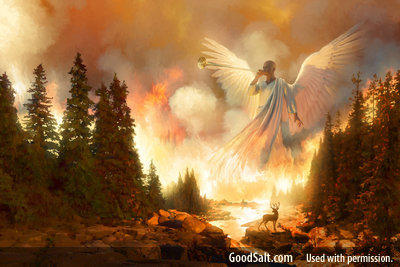 And the seven angels which had the seven trumpets prepared themselves to sound. The first angel sounded, and there followed hail and fire mingled with blood, and they were cast upon the earth: and the third part of trees was burnt up, and all green grass was burnt up.” (Revelation 8:6, 7)
And the seven angels which had the seven trumpets prepared themselves to sound. The first angel sounded, and there followed hail and fire mingled with blood, and they were cast upon the earth: and the third part of trees was burnt up, and all green grass was burnt up.” (Revelation 8:6, 7)
This is a great description of the war between the Goths, under Alaric who was a Roman officer who united the Germanic people, and Rome (395 A.D. - 410 A.D.). The “hailstorm” which John refers to is not a literal hailstorm, but is a great description of the Goths stampeding from the Alps ready to destroy everything in sight. They came as a hailstorm! The “fire mingled with blood” describes the terrible slaughter that followed that invasion, including “a third part of the trees” being burnt up. In his book, History of the Decline and Fall of the Roman Empire, Edward Gibbons states:
“The Gothic nation was in arms at the first sound of the trumpet ... The deep and bloody traces of the march of the Goths could easily be discovered after several years. The whole territory of Attica was blasted by the baneful presence of Alaric. ... In a season of extreme heat that the beds of the rivers were dry, Alaric invaded the dominion of the West. ... [the poet Claudian] pathetically lamented the fate of his contemporary trees, which must blaze in the conflagration [a disastrous fire] of the whole country; and the emperor of the Romans fled before the king of the Goths. A furious tempest was excited among the nations of Germany; from the northern extremity of which the barbarians marched almost to the gates of Rome. They achieved the destruction of the West. ... Many cities were cruelly oppressed, or destroyed. Many thousands were inhumanly massacred. The consuming flames of war spread over the greatest part of the seventeen provinces of Gaul. ... And in the pillage and fire of Rome, the streets of the city were filled with dead bodies; the flames consumed many public and private buildings ...”
The Second Trumpet
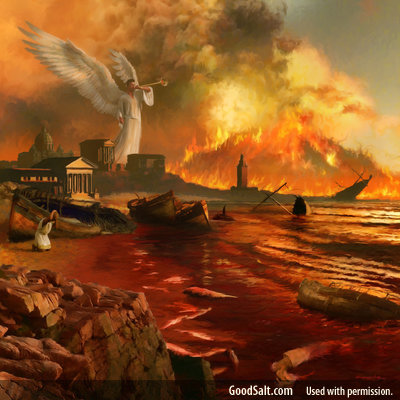 “And the second angel sounded, and as it were a great mountain burning with fire was cast into the sea: and the third part of the sea became blood; And the third part of the creatures which were in the sea, and had life, died; and the third part of the ships were destroyed.” (Revelation 8:8, 9)
“And the second angel sounded, and as it were a great mountain burning with fire was cast into the sea: and the third part of the sea became blood; And the third part of the creatures which were in the sea, and had life, died; and the third part of the ships were destroyed.” (Revelation 8:8, 9)
This scene seems to be describing war at sea or naval wars. At the sounding of the second trumpet the scene changes from the wars of the Baltic to the Mediterranean Sea. This trumpet gives a graphic description of when the Vandals invaded Rome from Africa through the Mediterranean Sea. In 455 A.D. Genseric, the leader of the Vandals, sailed into the mouth of the Tiber River, which divides the city of Rome. John’s description of “a great mountain burning with fire was cast into the sea” is a great description representing a naval battle.
Gensaric also pillaged the city and took thousands of people prisoner. Rome had 1,300 ships which far outnumbered the Vandals’. However, at night when it was dark Gensaric towed some of the Roman ships that were loaded with combustibles and set them on fire. Over 1,100 ships were destroyed, thus answering John’s description that “a third part of the ships were destroyed” (verse 9).
The Third Trumpet
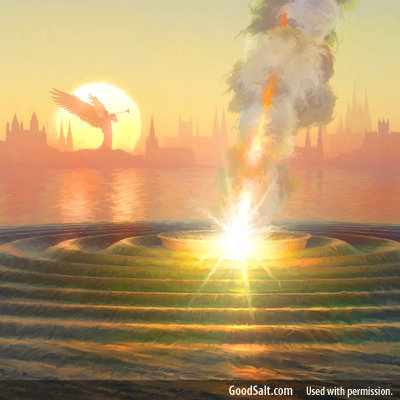 “And the third angel sounded, and there fell a great star from heaven, burning as it were a lamp, and it fell upon the third part of the rivers, and upon the fountains of waters; And the name of the star is called Wormwood: and the third part of the waters became wormwood; and many men died of the waters, because they were made bitter.” (Revelation 8:10, 11)
“And the third angel sounded, and there fell a great star from heaven, burning as it were a lamp, and it fell upon the third part of the rivers, and upon the fountains of waters; And the name of the star is called Wormwood: and the third part of the waters became wormwood; and many men died of the waters, because they were made bitter.” (Revelation 8:10, 11)
The third invasion of Rome was by the Huns. Scholars have linked the star that is seen burning like a lamp (torch) to be their leader, Attila. Attila burst on the scene like a blazing star, but also disappeared from the scene as though his light was quenched by water. He always arrayed himself in a brilliant manner - as a shining meteor!
The setting of this trumpet seems to be on the “rivers” and “springs of water.” The invasions of Attila were in the Alps and mainly on parts of the empire where rivers and streams flowed down from Italy.
The whole of Europe was desolated from the Volga to the Denude thus giving meaning to the name “Wormwood” which means “a calamity or a great disaster.” To this day the word “Hun” is a synonym for “plunder and destruction.”
The Fourth Trumpet
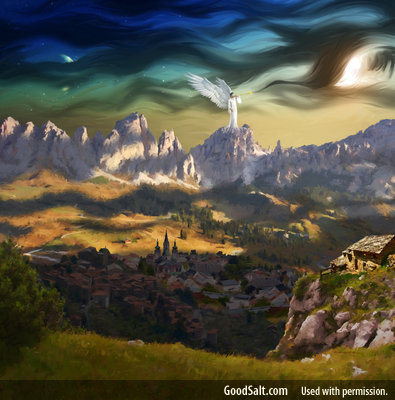 “And the fourth angel sounded, and the third part of the sun was smitten, and the third part of the moon, and the third part of the stars; so as the third part of them was darkened, and the day shone not for a third part of it, and the night likewise. And I beheld, and heard an angel flying through the midst of heaven, saying with a loud voice, Woe, woe, woe, to the inhabiters of the earth by reason of the other voices of the trumpet of the three angels, which are yet to sound!” (Revelation 8:12, 13)
“And the fourth angel sounded, and the third part of the sun was smitten, and the third part of the moon, and the third part of the stars; so as the third part of them was darkened, and the day shone not for a third part of it, and the night likewise. And I beheld, and heard an angel flying through the midst of heaven, saying with a loud voice, Woe, woe, woe, to the inhabiters of the earth by reason of the other voices of the trumpet of the three angels, which are yet to sound!” (Revelation 8:12, 13)
This trumpet describes the fourth invasion of Western Rome when Odoacer, the chief of a small remainder of the Atilla army, declared that the name and office of Rome’s last Western emperor, Romulus Augustulus, should be abolished. John’s description of the sun being struck and darkened refers to the emperor Romulus Augustulus. We have learned in our previous studies of Daniel 2 and 7 that Western Rome fell in 476 A.D., and as a result the Roman Empire was divided into ten parts.
John’s description of the moon and stars being darkened refers to the Roman consuls and senate who dimly continued after Romulus. The consuls glimmered until the time of Justinian, the emperor of the East, and was extinguished by Justinian in 541 A.D. The senate continued until Narses who defeated the Goths in 552 A.D. sealing the fate of the Roman senate.
John also describes that an angel gives this warning, “Woe, woe, woe, to the inhabiters of the earth by reason of the other voices of the trumpet of the three angels, which are yet to sound!” (Revelation 8:13). Why does the angel give this warning now? Well, if the fourth trumpet reveals that the “sun, moon and stars” of the Roman government were darkened what do you think lies ahead? Absolutely – the “Dark Ages”! We have seen in our studies of the little horn power that it was emperor Justinian himself who decreed that the bishop of Rome would be head over all the churches in 538 A.D., which begun the 1,260-year rule of the papacy. At that time Vigilius took the papal throne under the military protection of Belisarius, who led the military just before Narses took control of it and sealed the fate of the senate in 552 A.D.
The Fifth Trumpet
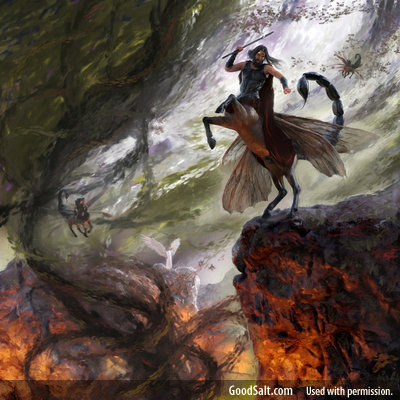 “And the fifth angel sounded, and I saw a star fall from heaven unto the earth: and to him was given the key of the bottomless pit. And he opened the bottomless pit; and there arose a smoke out of the pit, as the smoke of a great furnace; and the sun and the air were darkened by reason of the smoke of the pit. And there came out of the smoke locusts upon the earth: and unto them was given power, as the scorpions of the earth have power. And it was commanded them that they should not hurt the grass of the earth, neither any green thing, neither any tree; but only those men which have not the seal of God in their foreheads. And to them it was given that they should not kill them, but that they should be tormented five months: and their torment was as the torment of a scorpion, when he striketh a man. And in those days shall men seek death, and shall not find it; and shall desire to die, and death shall flee from them. And the shapes of the locusts were like unto horses prepared unto battle; and on their heads were as it were crowns like gold, and their faces were as the faces of men. And they had hair as the hair of women, and their teeth were as the teeth of lions. And they had breastplates, as it were breastplates of iron; and the sound of their wings was as the sound of chariots of many horses running to battle. And they had tails like unto scorpions, and there were stings in their tails: and their power was to hurt men five months. And they had a king over them, which is the angel of the bottomless pit, whose name in the Hebrew tongue is Abaddon, but in the Greek tongue hath his name Apollyon. One woe is past; and, behold, there come two woes more hereafter.” (Revelation 9:1-12)
“And the fifth angel sounded, and I saw a star fall from heaven unto the earth: and to him was given the key of the bottomless pit. And he opened the bottomless pit; and there arose a smoke out of the pit, as the smoke of a great furnace; and the sun and the air were darkened by reason of the smoke of the pit. And there came out of the smoke locusts upon the earth: and unto them was given power, as the scorpions of the earth have power. And it was commanded them that they should not hurt the grass of the earth, neither any green thing, neither any tree; but only those men which have not the seal of God in their foreheads. And to them it was given that they should not kill them, but that they should be tormented five months: and their torment was as the torment of a scorpion, when he striketh a man. And in those days shall men seek death, and shall not find it; and shall desire to die, and death shall flee from them. And the shapes of the locusts were like unto horses prepared unto battle; and on their heads were as it were crowns like gold, and their faces were as the faces of men. And they had hair as the hair of women, and their teeth were as the teeth of lions. And they had breastplates, as it were breastplates of iron; and the sound of their wings was as the sound of chariots of many horses running to battle. And they had tails like unto scorpions, and there were stings in their tails: and their power was to hurt men five months. And they had a king over them, which is the angel of the bottomless pit, whose name in the Hebrew tongue is Abaddon, but in the Greek tongue hath his name Apollyon. One woe is past; and, behold, there come two woes more hereafter.” (Revelation 9:1-12)
As I mentioned earlier, the fifth and sixth trumpets foretold the warfare against Eastern Rome. Contrary to modern interpretations, this fifth trumpet describes the rise a progress of the Arabs who are the descendants of Ishmael.
In Revelation 9:1 John writes, “And the fifth angel sounded, and I saw a star fall from heaven unto the earth: and to him was given the key of the bottomless pit (abyss).” Scholars link the fallen star to Mohammed, the prophet whom originated Mohammedanism (Muslim faith). Throughout history, Arabia has been called “the pit of the abyss” because of its deserts and empty areas, thus answering the prophetic scene of the star (Mohammed) being given the key to the bottomless pit (Arabia) and opening it (verses 1, 2). A star, along with a crescent moon, has long been the emblem of Islam.
John says that after the opening of the bottomless pit, “there arose a smoke out of the pit, as the smoke of a great furnace” (verse 2). The smoke rising out of the bottomless pit (Arabia) represents the spread of Mohammedanism (Muslim faith) which threatened Christianity.
John says that “locusts” came out of the pit. Throughout Scripture, God uses the symbol of locusts to describe the invasion of a rival army:
“Egypt will hiss like a fleeing serpent, for the enemy will advance in force; with axes they will come against her like woodsmen cutting down trees. They will chop down her forest, declares the LORD, dense though it may be, for they are more numerous than locusts; they cannot be counted.” (Jeremiah 46:22, 23, Berean Study Bible)
“The LORD of Hosts has sworn by Himself: ‘Surely I will fill you up with men as with locusts, and they will shout in triumph over you.’” (Jeremiah 51:14, Berean Study Bible)
Who are these locusts?
“So, what was John talking about when he described the army of locusts? A fleet of 21st-century military helicopters? Some modern-day teachers who promote trendy, pop interpretations of prophecy see nothing more than helicopters in these verses. Christians of the past, who knew history better than most of us do, saw this army of locusts as a prophecy of the rise and spread of Islam. Writer Robert Wieland states that the Reformers ‘clearly recognized Islam’ in this passage. [‘Islam Challenges the World,’ Signs of the Times, August 1985]. John Foxe, author of Foxe's Book of Martyrs, said that it is ‘clearer than light itself’ that this is a prophecy of the Muslim conquests. [ibid]. ‘Well into the nineteenth century a chorus of Protestant prophetic scholars identified Islam’s niche in prophecy as being these fifth and sixth trumpets,’ Wieland says. [ibid]. Commentator Albert Barnes wrote; ‘With surprising unanimity, commentators have agreed in regarding this as referring to the empire of the Saracens [Arab Muslims -- DB], or to the rise and the progress of the religion and the empire set up by Muhammed.’ [Barnes’ Notes on the Bible, Vol. 18, 398.4]. Commentators may not agree with unanimity anymore, but many of the older commentators agree. W. B. Godbey began his comments on Revelation 9 by stating, ‘This chapter is a thrilling description of the rise and progress of the Mohammedan wars.’ [W. B. Godbey, Commentary on the New Testament, Vol. 1, 49.5]. Adam Clarke said that John's description of the army of locusts ‘certainly agrees better with the Saracens [Arabs] than with any other people or nation’ and ‘agrees very well with the troops of Mohammed.’ [Clarke's Commentary, Vol. 18; 1098, 1100.6]. Matthew Henry referred to the army of locusts as ‘the armies of the Mohamedan empire.’ [Matthew Henry’s Commentary on the Whole Bible, Vol. 10, 1167.7]. John Wesley said, ‘All this agrees with the slaughter which the Saracens [Arabs] made for a long time after Mahomet’s [Mohammed’s] death.’ [John Wesley’s Notes on the Whole Bible, 903.8].”
We can be sure this is not a mere guess from all the commentators, by looking at what the Bible says about the Midianites:
“Then the children of Israel did evil in the sight of the Lord. So the Lord delivered them into the hand of Midian for seven years, and the hand of Midian prevailed against Israel. Because of the Midianites, the children of Israel made for themselves the dens, the caves, and the strongholds which are in the mountains. So it was, whenever Israel had sown, Midianites would come up; also Amalekites and the people of the East would come up against them. Then they would encamp against them and destroy the produce of the earth as far as Gaza, and leave no sustenance for Israel, neither sheep nor ox nor donkey. For they would come up with their livestock and their tents, coming in as numerous as LOCUSTS; both they and their camels were without number; and they would enter the land to destroy it. So Israel was greatly impoverished because of the Midianites ....” (Judges 6:1-6, New King James Version)
Why is it important to link the Midianites with the locusts? Midian is in the northwest Arabian Peninsula, on the east shore of the Gulf of Aqaba on the Red Sea. This is where Moses went to live with his father-in-law Jethro for ten years. It is also the true location of Mount Sinai, also known as Horeb, but known today as Jebel Al-Lawz (Exodus 3:1; Galatians 4:25). The book of Judges goes on to say that the Midianites were indeed Ishmaelites:
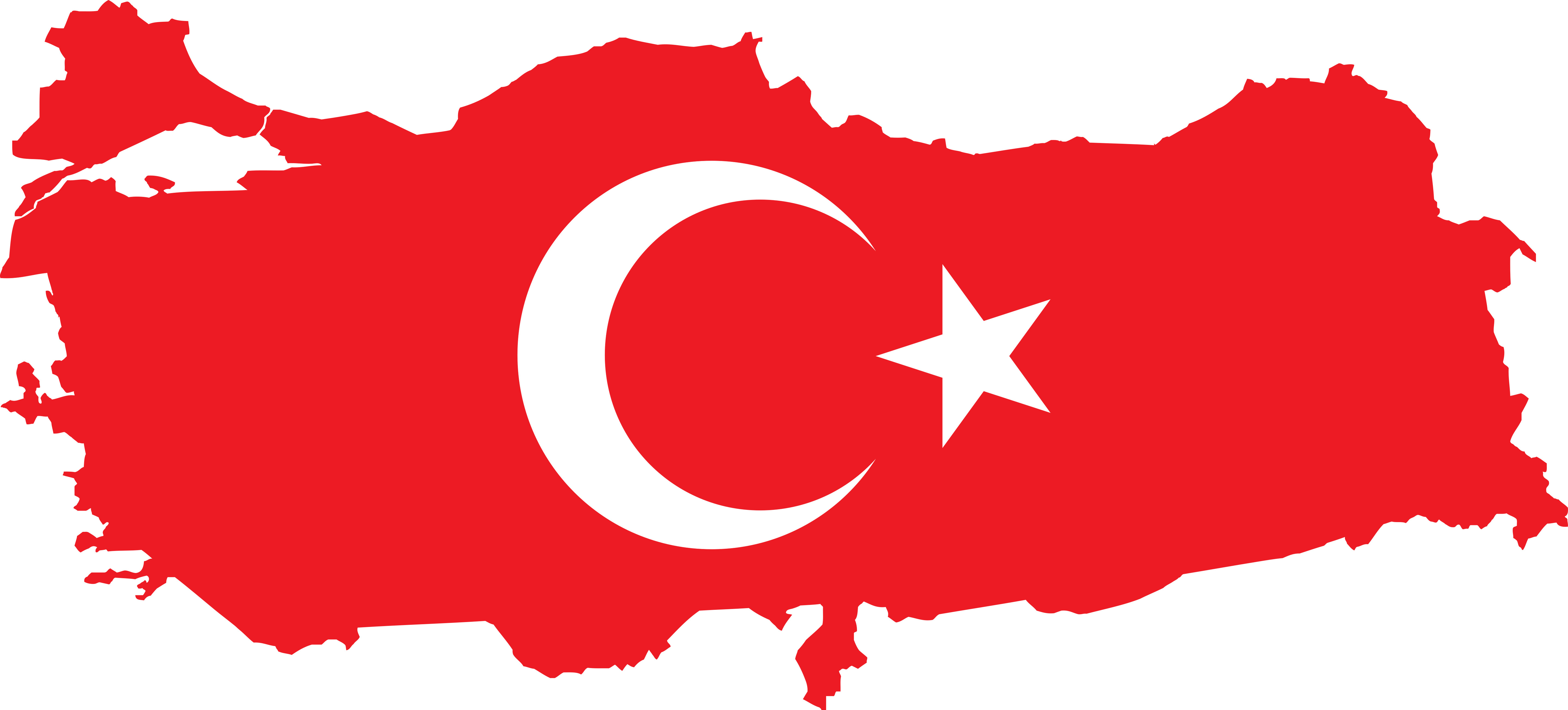 “So Zebah and Zalmunna said, ‘Rise yourself, and kill us; for as a man is, so is his strength.’ So Gideon arose and killed Zebah and Zalmunna, and took the crescent (moon) ornaments that were on their camels’ necks. Then the men of Israel said to Gideon, ‘Rule over us, both you and your son, and your grandson also; for you have delivered us from the hand of Midian.’ But Gideon said to them, ‘I will not rule over you, nor shall my son rule over you; the Lord shall rule over you.’ Then Gideon said to them, ‘I would like to make a request of you, that each of you would give me the earrings from his plunder.’ For they had golden earrings (in the shape of a crescent moon), because they were Ishmaelites.” (Judges 8:21-24)
“So Zebah and Zalmunna said, ‘Rise yourself, and kill us; for as a man is, so is his strength.’ So Gideon arose and killed Zebah and Zalmunna, and took the crescent (moon) ornaments that were on their camels’ necks. Then the men of Israel said to Gideon, ‘Rule over us, both you and your son, and your grandson also; for you have delivered us from the hand of Midian.’ But Gideon said to them, ‘I will not rule over you, nor shall my son rule over you; the Lord shall rule over you.’ Then Gideon said to them, ‘I would like to make a request of you, that each of you would give me the earrings from his plunder.’ For they had golden earrings (in the shape of a crescent moon), because they were Ishmaelites.” (Judges 8:21-24)
These “locusts” were forbidden to “hurt the grass of the earth, neither any green thing, neither any tree; but only those men which have not the seal of God in their foreheads” (verses 3, 4). In the year 632 A.D., when the Arabian tribes gathered together to attack Syria, Mohammed’s uncle, Abu-Bekr, who succeeded Mohammed after his death, gave the following command, which fits the command given in verse 4 perfectly:
“When you fight the battles of the Lord, acquit yourselves like men, without turning your backs; but let not your victory be stained with blood of women or children. Destroy no palm trees, nor burn any fields of corn. Cut down no fruit trees, not do any mischief to cattle, only such as you kill to eat. When you make any covenant or article, stand to it, and be as good as your word. As you go on, you will find some religious persons who live in retired monasteries, and propose to themselves to serve God that way: let them alone, and neither kill them nor destroy their monasteries: and you will find another sort of people, that belong to the synagogue of Satan, who have shaven crowns; be sure you cleave their skulls, and give them no quarter till they either turn Mohammetans or pay tribute.” (E. Gibbon, The History of the Decline and Fall of the Roman Empire, chapter 51)
This amazing accuracy of the prophecy doesn’t end here! John says that:
- “the shapes of the locusts were like unto horses prepared unto battle” (verse 7) – The skill of horsemanship is an Arabian art.
- “and on their heads were as it were crowns like gold” (verse 7) – The Arabians wore turbans or headdresses.
- “Their faces were as the faces of men” (verse 7) – The Arabians wore beards.
- “they had hair as the hair of women” (verse 8) – The Arabians had long hair.
- “their teeth were as the teeth of lions” (verse 8) – The Arabians were fearless fighters.
John also writes, “And they had a king over them, which is the angel of the bottomless pit, whose name in the Hebrew tongue is Abaddon, but in the Greek tongue hath his name Apollyon” (verse 11). These two names show the satanic character of those Arabian warriors. Abaddon means, “the destroyer,” and Apollyon means, “one that exterminates.” This is the very character of Satan himself:
“Be sober, be vigilant; because your adversary the devil, as a roaring lion, walketh about, seeking whom he may devour.” (1 Peter 5:8)
In fact, God calls Satan “the Destroyer” in Exodus chapter 12:
“For I will pass through the land of Egypt this night, and will smite all the firstborn in the land of Egypt, both man and beast; and against all the gods of Egypt I will execute judgment: I am the LORD … For the LORD will pass through to smite the Egyptians; and when He seeth the blood upon the lintel, and on the two side posts, the LORD will pass over the door, and will not suffer the Destroyer to come in unto your houses to smite you.” (Exodus 12:12, 23)
Please note that it was not God who killed the firstborn sons of Egypt, but one called “the Destroyer.” In verse 12 where God says, “I will pass through the land of Egypt this night, and will smite all the firstborn in the land of Egypt”, he is speaking in the permissive sense, not in the causative sense. God would smite all the firstborn by not preventing “the Destroyer” (Satan) to go into their houses to smite them.
God does not directly destroy any man, but He will allow the inherent consequences of our own destructive choices. He will never interfere with our free choice. God does not need to interfere and destroy the sinner; “For the wages of sin is death” (Romans 6:23). The work of sin is paid with death. It is sin itself (not God) which brings death:
“Let no man say when he is tempted, I am tempted of God: for God cannot be tempted with evil, neither tempteth he any man: But every man is tempted, when he is drawn away of his own lust, and enticed. Then when lust hath conceived, it bringeth forth sin: and sin (not God), when it is finished, bringeth forth death.” (James 1:13-15)
Satan is the Destroyer, God is the Restorer! (See the article entitled, Who Really Killed the Firstborn in Egypt? for more details).
John says the Arabian warriors were given power to “hurt men five months” (verses 5, 10). When we use the prophetic year/day principle we have learned to calculate the time prophecies in the Bible, we see that these “five months” are a full 150 years (5 X 30 days [Jewish month] = 150 days/years).
Near the close of the 13th century, Othman founded a government known as the Ottoman Empire. This empire grew until it finally united the Mohammedan tribes into one monarchy. Seeing that Mohammedan and Tatar tribes were always divided with no organization, we see that when John saw that the people “had a king over them” (verse 11), he must have been referring to the monarchy that Othman organized. Thus the 150 years of “destroying” and “exterminating” must be during the time of the Ottoman Empire. It was on July 29, 1299 when Othman first invaded the territory of Niccomedia, and from that time the destructive power of his empire grew rapidly. Thus we have a starting point of the 150 years of “destruction” and “exterminating.” It is pinpointed in the year 1299 A.D. When we add the 150 years to the year 1299 we come to the year 1449 A.D. This is the very year that the Ottoman Empire conquered the Greek Empire! After this prophetic scene, John heard an angel declare, “One woe is past; and, behold, there come two woes more hereafter” (verse 12).
The Sixth Trumpet
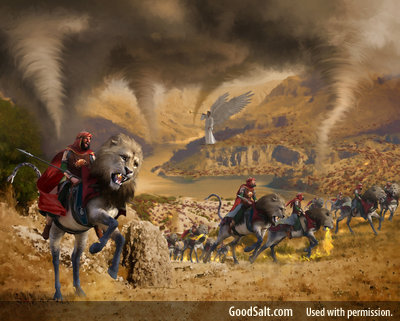 “And the sixth angel sounded, and I heard a voice from the four horns of the golden altar (of incense) which is before God, Saying to the sixth angel which had the trumpet, Loose the four angels which are bound in the great river Euphrates. And the four angels were loosed, which were prepared for an hour, and a day, and a month, and a year, for to slay the third part of men. And the number of the army of the horsemen were two hundred thousand thousand: and I heard the number of them. And thus I saw the horses in the vision, and them that sat on them, having breastplates of fire, and of jacinth, and brimstone: and the heads of the horses were as the heads of lions; and out of their mouths issued fire and smoke and brimstone. By these three was the third part of men killed, by the fire, and by the smoke, and by the brimstone, which issued out of their mouths. For their power is in their mouth, and in their tails: for their tails were like unto serpents, and had heads, and with them they do hurt. And the rest of the men which were not killed by these plagues yet repented not of the works of their hands, that they should not worship devils, and idols of gold, and silver, and brass, and stone, and of wood: which neither can see, nor hear, nor walk: Neither repented they of their murders, nor of their sorceries, nor of their fornication, nor of their thefts.” (Revelation 9:13-21)
“And the sixth angel sounded, and I heard a voice from the four horns of the golden altar (of incense) which is before God, Saying to the sixth angel which had the trumpet, Loose the four angels which are bound in the great river Euphrates. And the four angels were loosed, which were prepared for an hour, and a day, and a month, and a year, for to slay the third part of men. And the number of the army of the horsemen were two hundred thousand thousand: and I heard the number of them. And thus I saw the horses in the vision, and them that sat on them, having breastplates of fire, and of jacinth, and brimstone: and the heads of the horses were as the heads of lions; and out of their mouths issued fire and smoke and brimstone. By these three was the third part of men killed, by the fire, and by the smoke, and by the brimstone, which issued out of their mouths. For their power is in their mouth, and in their tails: for their tails were like unto serpents, and had heads, and with them they do hurt. And the rest of the men which were not killed by these plagues yet repented not of the works of their hands, that they should not worship devils, and idols of gold, and silver, and brass, and stone, and of wood: which neither can see, nor hear, nor walk: Neither repented they of their murders, nor of their sorceries, nor of their fornication, nor of their thefts.” (Revelation 9:13-21)
The sixth trumpet reveals that four angels, who were bound in “the great river Euphrates,” are let loose to “slay the third part of men” (Revelation 9:13, 14). These four destructive angels are not God’s angels. The sixth angel with the trumpet releases the destructive evil angels. This again is how God’s wrath operates. God never directly destroys anyone, but He will permit the natural consequences of our own destructive choices. This is how ancient Egypt was destroyed:
“How He (God) had wrought His signs in Egypt, and His wonders in the field of Zoan: And had turned their rivers into blood; and their floods, that they could not drink. He sent divers sorts of flies among them, which devoured them; and frogs, which destroyed them. He gave also their increase unto the caterpiller, and their labour unto the locust. He destroyed their vines with hail, and their sycomore trees with frost. He gave up their cattle also to the hail, and their flocks to hot thunderbolts. He cast upon them the fierceness of His anger, wrath, and indignation, and trouble, by sending evil angels among them.” (Psalm 78:43-49)
Here again we see phrases like “He turned their rivers into blood”, “He sent flies among them”, “He destroyed their vines.” These are all in the permissive sense, and not in the causative sense. When it says “He cast upon them the fierceness of His anger, wrath, and indignation, and trouble, by sending evil angels among them”, the word for “sending” means “to let loose” or “release” just as we find the angel with the sixth trumpet doing. In Young’s Literal Translation it reads: “He sendeth on them the fury of His anger, Wrath, and indignation, and distress -- A discharge of evil messengers.”
The word “sending” can also be used in the sense of “giving them over” to whatever the destruction is. When it talks about the cattle in Psalm 78 it says, “He gave up their cattle also to the hail, and their flocks to hot thunderbolts.” This again is how God’s wrath is executed, He gives man over to our own destructive ways. Paul defines what God’s wrath is by using the same language:
“For the wrath of God is revealed from heaven against all ungodliness and unrighteousness of men, who hold the truth in unrighteousness … Because that, when they knew God, they glorified Him not as God, neither were thankful; but became vain in their imaginations, and their foolish heart was darkened. Professing themselves to be wise, they became fools, And changed the glory of the uncorruptible God into an image made like to corruptible man, and to birds, and fourfooted beasts, and creeping things. Wherefore God also gave them up to uncleanness through the lusts of their own hearts, to dishonour their own bodies between themselves: Who changed the truth of God into a lie, and worshipped and served the creature more than the Creator, who is blessed for ever. Amen. For this cause God gave them up unto vile affections: for even their women did change the natural use into that which is against nature: And likewise also the men, leaving the natural use of the woman, burned in their lust one toward another; men with men working that which is unseemly, and receiving in themselves that recompence of their error which was meet. And even as they did not like to retain God in their knowledge, God gave them over to a reprobate mind, to do those things which are not convenient.” (Romans 1:18, 21-28)
The act of releasing destruction is also found in Revelation chapter 7 where four of God’s angels are “standing at the four corners of the earth, holding back the four winds so they did not blow on the earth or the sea, or even on any tree.” (Revelation 7:1, New Living Translation). Another angel, who has the seal of the living God, comes to them and says, “’Wait! Don’t harm the land or the sea or the trees until we have placed the seal of God on the foreheads of his servants.’” (Verses 2 and 3, New Living Translation). Remember, its not God’s angels doing the harming, but what they are holding back and releasing.
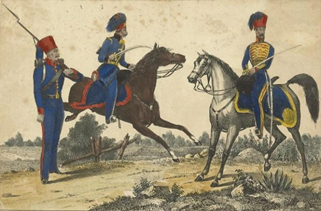 Scholars believe these four angels who are loosed from the Euphrates River represent Aleppo, Iconium, Damascus, and Baghdad which were part of the Ottoman Empire that was situated in the region of the Euphrates River. John also says that these four angels had “breastplates of fire, and of jacinth, and brimstone” (verse 17), or as the New King James says, “breastplates of fiery red, hyacinth blue, and sulfur yellow.” This is an accurate description of the Ottoman Turkish horsemen as they rode into battle wearing uniforms of red, blue and yellow!
Scholars believe these four angels who are loosed from the Euphrates River represent Aleppo, Iconium, Damascus, and Baghdad which were part of the Ottoman Empire that was situated in the region of the Euphrates River. John also says that these four angels had “breastplates of fire, and of jacinth, and brimstone” (verse 17), or as the New King James says, “breastplates of fiery red, hyacinth blue, and sulfur yellow.” This is an accurate description of the Ottoman Turkish horsemen as they rode into battle wearing uniforms of red, blue and yellow!
John sees that “out of their (the horses’) mouths issued fire and smoke and brimstone” (verse 17). The Ottoman Turk introduced firearms into battles. These men would fire their muskets from their hips, so to John it would appear as if fire and smoke were coming from the horses’ mouths.
These followers of Mohammed threatened to submerge all of Europe. However, they began to decline in power until 1838 A.D., when trouble broke out between the sultan (Muslim ruler – emperor of Turkey) and Mehemet Ali, who was the pasha of Egypt. For the time, foreign intervention prevented war. But one year later the sultan’s army was destroyed and taken prisoner in Egypt. As a result, the sultan asked Europe for help and a conference was held in London among England, Russia, Austria, and Prussia, with Effendi Bey Likgis as the Ottoman lawyer and a ultimatum was drawn up to be presented to Egypt on August 11, 1840 A.D.
John gives us a time-prophecy of how this power would continue when he wrote, “the four angels were loosed, which were prepared for an hour, and a day, and a month, and a year” (verse 15). An “hour” is 1/24 part of a day. This fractional part of a year is 15 days. Therefore the “hour” in prophetic time equals 15 days. Since a day equals a year in Bible prophecy, the “day” that John mentions equals one year. The Jewish “month” consisted of 30 days. Therefore, the “month” that John refers to equals a full 30 years. Since there are 30 days in the Jewish month, a year would consist of 360 days. Therefore, the “year” that John speaks of equals a full 360 years. Thus we have a total of 391 years and 15 days (15 days + 1 year + 30 years + 360 years = 391 years and 15 days).
Now keep in mind that the 391 years and 15 days must have come to an end at the time the ultimatum reached Egypt on August 11, 1840. And remember, we have already learned from the previous trumpet that the Ottoman Empire was to continue “destroying” and “exterminating” for “five months” (150 years, Revelation 9:5,10). This we learned was from July 27, 1299 to 1449. When we add the 391 years and 15 days to the year 1449, we come to August 11, 1840 – The very date the ultimatum reached Egypt! Yes, Bible prophecy can be trusted!
The Seventh Trumpet
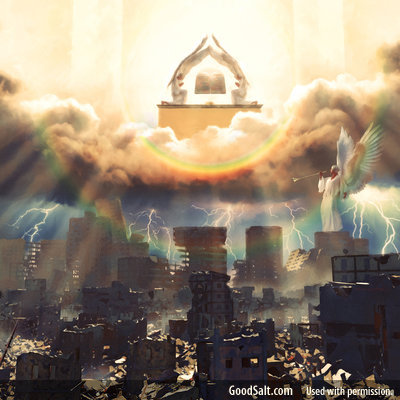 “And the seventh angel sounded; and there were great voices in heaven, saying, The kingdoms of this world are become the kingdoms of our Lord, and of His Christ; and He shall reign for ever and ever. And the four and twenty elders, which sat before God on their seats, fell upon their faces, and worshipped God, Saying, We give Thee thanks, O Lord God Almighty, which art, and wast, and art to come; because Thou hast taken to thee Thy great power, and hast reigned. And the nations were angry, and Thy wrath is come, and the time of the dead, that they should be judged, and that Thou shouldest give reward unto thy servants the prophets, and to the saints, and them that fear Thy name, small and great; and shouldest destroy them which destroy the earth. And the temple of God was opened in heaven, and there was seen in His temple the Ark of His Testament (Ark of the Covenant): and there were lightnings, and voices, and thunderings, and an earthquake, and great hail.” (Revelation 11:15-19)
“And the seventh angel sounded; and there were great voices in heaven, saying, The kingdoms of this world are become the kingdoms of our Lord, and of His Christ; and He shall reign for ever and ever. And the four and twenty elders, which sat before God on their seats, fell upon their faces, and worshipped God, Saying, We give Thee thanks, O Lord God Almighty, which art, and wast, and art to come; because Thou hast taken to thee Thy great power, and hast reigned. And the nations were angry, and Thy wrath is come, and the time of the dead, that they should be judged, and that Thou shouldest give reward unto thy servants the prophets, and to the saints, and them that fear Thy name, small and great; and shouldest destroy them which destroy the earth. And the temple of God was opened in heaven, and there was seen in His temple the Ark of His Testament (Ark of the Covenant): and there were lightnings, and voices, and thunderings, and an earthquake, and great hail.” (Revelation 11:15-19)
The seventh and final trumpet isn’t opened until the 15th verse of Revelation chapter 11. Therefore, chapter 10 and part of chapter 11 describe what would happen between the sixth and seventh trumpet. Just as the seventh chapter describes what will happen between the sixth and seventh seal.
The seventh trumpet reveals that “The kingdoms of this world are become the kingdoms of our Lord, and of His Christ” (Revelation 11:15). All human kingdoms (the way in which we selfishly think, govern, and execute justice) will one day collapse and God’s kingdom (the way in which He selflessly thinks, governs, and executes justice) will be the only one standing.
At the beginning of this seventh trumpet the proclamation goes out that God’s wrath (allowing man to reap what they have chosen) “is come, and the time of the dead, that they should be judged” (verse 18), therefore, this seventh trumpet describes a time of judgment (cleansing the sanctuary) which continues to the Second Coming. This seventh trumpet parallels the seventh church of Laodicea which describes the “Era of Judgment.”
The proclamation of the seventh trumpet is set at the beginning of this time of judgment/cleansing. John says that he saw “the temple of God was opened in heaven, and there was seen in His temple the Ark of His Testament (Ark of the Covenant)”, which we have already learned is a reference to the inner or second apartment of the sanctuary, called the “the Holy of Holies.”
Here we must conclude that John is looking into the Holy of Holies of the heavenly sanctuary. God gave the Israelites the command of placing His Law of Ten Commandments inside the ark of the covenant.
On the first day of each month (New Moon) in the Hebrew calendar they were to blow the shofar (trumpet), but on the first day of the seventh month (Tishri 1) began the 10-day Feast of Trumpets on which multiple shofars were sounded. In previous studies of this series, we have learned that the Feast of Trumpets and the Day of Atonement represent the days of the final judgment (called “the ten days of awe”). When the shofar was sounded on the first day of the first six months it was a reminder of the coming seventh month on which the final judgment would begin by the sounding of multiple shofar blasts on the Feast of Trumpets. So, we have six shofar blasts leading to the seventh shofar blast announcing the judgment - a total of SEVEN trumpet blasts!
Each “cause and effect” that happens during each of the first six trumpets in Revelation chapters 8 through 10 are a warning of when “the seventh angel” would sound his shofar at the beginning of the heavenly Feats of Trumpets in chapter 11 announcing it was a time of judgment when the “temple of God was opened in heaven, and there was seen in His temple the Ark of His Testament (Ark of the Covenant)” on the heavenly Day of Atonement.
Therefore, since John was shown the “Ark of His Covenant”, something about the Law was being revealed to him that relates to the judgment.
“Let us hear the conclusion of the whole matter: Fear God, and keep His Commandments: for this is the whole duty of man. For God shall bring every work into judgment, with every secret thing, whether it be good, or whether it be evil.” (Ecclesiastes 12:13, 14)
God will bring all your own choices into judgment. You will have the liberty to decide for yourself!
“For whosoever shall keep the whole Law, and yet offend in one point, he is guilty of all. For He that said, Do not commit adultery, said also, Do not kill. Now if thou commit no adultery, yet if thou kill, thou art become a transgressor of the Law. So speak ye, and so do, as they that shall be judged by the Law of liberty. For he shall have judgment without mercy, that hath showed no mercy; and mercy rejoiceth against judgment.” (James 2:10-13)
When we ask for God’s forgiveness, we are asking that we be made empty of man’s sinful form of justice so that our Father’s righteous system of justice be imparted in us in order that it may be reflected through us. However, if condemning and judging without mercy is what you believe a good system of justice is, then please remember, God “will render (give) to every man according to his deeds” (Romans 2:6). You will receive according to the way you have judged others and you will have no excuse nor complaint about it. God will accept your own verdict against yourself and will declare that this sentence is just. Our own sentence will mirror back the quality of forgiveness we have shown to others: “forgive us our debts, as (just like) we forgive our debtors” (Matthew 6:12).
You will have the choice to either accept His forgiveness and salvation or “judge yourselves unworthy of everlasting life” (Acts 13:46). It all depends on how you judge God; for “the hour of HIS judgment is come” (Revelation 14:7).
“… Indeed, let God be true but every man a liar. As it is written: ‘That You (God) may be justified in Your words, And may overcome when You (God) are judged.’” (Romans 3:4, New King James Version)
And remember, we have learned from previous studies that Jesus stepped into the second apartment of the heavenly sanctuary to perform a work of judgment/cleansing in the Fall of 1844. In our study of the seven churches, we learned that this belief stems from the time of William Miller when he began to proclaim that Jesus was coming back to cleanse the earth. And get this, the Millerite movement, as it was called, began in 1840, the very year the Ottoman Empire would collapse, as foretold in the sixth trumpet at the close of Revelation 9. Then, when the seventh trumpet began to sound, John hears the twenty-four elders say a time of judgment is to begin and he sees the Holy of Holies open in heaven to reveal the Ark of the Covenant at the close of Revelation 11.
In our study of the seven churches, we saw that the events revealed in chapter 10 and part of 11 parallel the time of the Millerite Movement. In Revelation 10:7 the mighty angel who gives John the unsealed book of Daniel says, “But in the days of the voice of the seventh angel, when he shall begin to sound, the mystery of God should be finished, as He hath declared to His servants the prophets.” So, the “mystery of God” would be finished during the seventh trumpet which is during a time of judgment/cleansing. In Ephesians 6:19 Paul prays that he may speak boldly “to make known the mystery of the gospel.” In Romans 1:16 Paul calls the gospel “the power of God unto salvation.” In Colossians 1:27 Paul says he wants to make known “this mystery among the Gentiles; which is Christ in you, the hope of glory.” John wrote that “the everlasting gospel” to “fear God, and give glory to Him” will be intensified in the last days because “the hour of His judgment is come” (Revelation 14:6, 7).
After the Ark of the Covenant is seen in the temple, John writes that “there were lightnings, and voices, and thunderings, and an earthquake, and great hail.” (Revelation 11:19). A similar scene is witnessed by the Israelites at the base of Mount Sinai while God spoke the Ten Commandments:
“And all the people saw the thunderings, and the lightnings, and the noise of the trumpet, and the mountain smoking: and when the people saw it, they removed, and stood afar off. And they said unto Moses, Speak thou with us, and we will hear: but let not God speak with us, lest we die. And Moses said unto the people, Fear not: for God is come to prove you, and that His fear may be before your faces, that ye sin not. And the people stood afar off, and Moses drew near unto the thick darkness where God was.” (Exodus 20:18-21)
Take note how the Israelites were trembling in fear while “Moses drew near unto the thick darkness where God was.” A little later we read, “And the sight of the glory of the LORD was like devouring fire on the top of the mount in the eyes of the children of Israel. And Moses went into the midst of the cloud, and gat him up into the mount: and Moses was in the mount forty days and forty nights.” (Exodus 24:17, 18). Again we see the Israelites trembling in fear while Moses goes up and communes with God. The wording here is that “the sight of the glory of the LORD was like devouring fire on the top of the mount in the eyes of the children of Israel.” It was in their “eyes”, their own misunderstanding of God’s character, that God was seen as a fearful sight. In their “eyes” (false understanding) God “was turned to be their enemy” (Isaiah 63:10). After Moses came down from the Mount, his face shown with the glory (character) of God to the point that the Israelites told him to put a veil over his face (Exodus 34:29-35). The glory (loving, selfless character) of God “tormented” and exposed their sinful (selfish) souls.
While in the mindset of not understanding God’s true character, we will see God as a fearful sight (thunders, lightnings, earthquakes, fire, hail etc.). God humbled Elijah by revealing to him His character:
“And He (God) said, Go forth, and stand upon the mount before the LORD. And, behold, the LORD passed by, and a great and strong wind rent the mountains, and brake in pieces the rocks before the LORD; but the LORD was not in the wind: and after the wind an earthquake; but the LORD was not in the earthquake: And after the earthquake a fire; but the LORD was not in the fire: and after the fire a still small voice.” (1 Kings 19:11, 12)
So where did the wind, earthquake and fire come from if they did not come from God? They came from Elijah! The closer God came to Elijah, the more Elijah’s violent and condemning character was exposed from within him. For more info on Elijah, see the article entited: Didn’t God Send Fire Down From Heaven and Consume the Soldiers at the Command of Elijah?
John tells us that when the Father spoke to Jesus some people said “that it thundered: others said, An angel spake to him.” (John 12:29). Those who were outside of God’s character only heard thunder, while those who understood God’s character more fully heard the voice of an angel. Likewise, the Israelites at Mount Sinai heard thunder, while Moses went up into the Mount to hear “the still small voice.”
In Daniel 12 we read:
“And he (the angel) said, Go thy way, Daniel: for the words are closed up and sealed till the time of the end. Many shall be purified, and made white, and tried; but the wicked shall do wickedly: and none of the wicked shall understand; but the wise shall understand.” (Daniel 12:9-12)
This is why we all need the seal of the living God! While others hear thunder and see lightning, smoke and fire, we will see “flashes of insight, rumblings of understanding, peals of thunderous adoration, a foundational collapse of earth-based thinking, and a great hailstorm of truth.” (Revelation 11:19, The Remedy Bible).
During the seventh trumpet and the time of the judgment/cleansing, the gospel of Christ, which is the power of God, will be fully manifested in the lives of those who receive the seal of the living God in their foreheads (minds/reasonings) just before the Second Coming. Will you accept Christ to come into your soul temple and cleanse your mind from all the lies and abominations where Satan’s seat is? Will you accept the mind of Christ?
“Fulfil ye My joy, that ye be likeminded, having the same love, being of one accord, of one mind. Let nothing be done through strife or vainglory; but in lowliness of mind let each esteem other better than themselves. Look not every man on his own things, but every man also on the things of others. Let this mind be in you, which was also in Christ Jesus.” (Philippians 2:2-5)
“But the natural man receiveth not the things of the Spirit of God: for they are foolishness unto him: neither can he know them, because they are spiritually discerned. But he that is spiritual judgeth all things, yet he himself is judged of no man. For who hath known the mind of the Lord, that he may instruct him? But we have the mind of Christ.” (1 Corinthians 2:14-16)
Having the mind of Christ cleanses us from our vicious forms of worldly warfare. We will no longer have the preconceived notion that “The LORD is a man of war.” (Exodus 15:3). When God called David to the throne, the prophet Samuel said “the LORD hath sought Him a man after His own heart, and the LORD hath commanded him (David) to be captain over His people …” (1 Samuel 13:14). But was David always a man after God’s own heart? No. David himself tells us the reason why he was not to build the temple of the Lord: “But God said unto me, Thou shalt not build an house for My name, because thou hast been a man of war, and hast shed blood” (1 Chronicles 28:3). Being a “man of war” and to “shed blood” is not in harmony with God’s “name” (character), therefore His name (character) cannot dwell in our “house” (soul temple). Paul tells us there are times when God has winked at our ignorance, “but now commandeth all men everywhere to repent” (Acts 17:30).
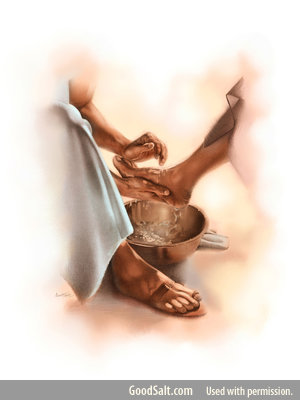 Scripture says Jesus is the one who will ultimately build the temple of the Lord (Zechariah 6:12, 13). What does this tell us about Christ’s character? It tells us that He is not a man of war. He’d rather shed His own blood, than to shed others’! Isaiah prophesied of the coming Messiah saying, “They intended to bury Him with criminals, but He ended up in a rich man's tomb, because He had committed no violent deeds, nor had He spoken deceitfully.” (Isaiah 53:9, New English Translation). And Jesus Himself says, “Let Me teach you, because I am humble and gentle at heart, and you will find rest for your souls.” (Matthew 11:29, New Living Translation).
Scripture says Jesus is the one who will ultimately build the temple of the Lord (Zechariah 6:12, 13). What does this tell us about Christ’s character? It tells us that He is not a man of war. He’d rather shed His own blood, than to shed others’! Isaiah prophesied of the coming Messiah saying, “They intended to bury Him with criminals, but He ended up in a rich man's tomb, because He had committed no violent deeds, nor had He spoken deceitfully.” (Isaiah 53:9, New English Translation). And Jesus Himself says, “Let Me teach you, because I am humble and gentle at heart, and you will find rest for your souls.” (Matthew 11:29, New Living Translation).
Jesus said, “My Kingdom is not an earthly kingdom. If it were, My followers would fight to keep Me from being handed over to the Jewish leaders. But My Kingdom is not of this world” (John 18:36, New Living Translation). Commenting on this John Gill says:
“If Christ's kingdom had been a worldly one, set up on worldly views, and governed with worldly policy, and was to answer some worldly ends, Christ would have had servants enough among the Jews, who would have declared for him, and took up arms in his favour against the Romans … [however] it [Christ’s kingdom] does not rise out of, nor proceed upon, nor is it supported by worldly principles, wherefore none of the above methods are made use of.” (Gill’s Bible Exposition)
Paul tells us:
“For we wrestle not against flesh and blood, but against principalities, against powers, against the rulers of the darkness of this world, against spiritual wickedness in high places (who all misrepresent God’s character). Wherefore take unto you the whole armour of God, that ye may be able to withstand in the evil day, and having done all, to stand. Stand therefore, having your loins girt about with truth (concerning God’s character), and having on the breastplate of righteousness (Christ-like character); And your feet shod with the preparation of the gospel of peace; Above all, taking the shield of faith, wherewith ye shall be able to quench all the fiery darts (temptations) of the wicked. And take the helmet of salvation (which protects your healed mind), and the sword of the Spirit, which is the word of God (to combat the destructive lies of Satan).” (Ephesians 6:12-17)
God never intended His people to take the Promised Land by warfare and force. Like the spread of locusts during the fifth trumpet, God speaks of “hornets” driving out the inhabitants:
“And I (God) will send hornets before thee, which shall drive out the Hivite, the Canaanite, and the Hittite, from before thee. I will not drive them out from before thee in one year; lest the land become desolate, and the beast of the field multiply against thee. By little and little I will drive them out from before thee, until thou be increased, and inherit the land. And I will set thy bounds from the Red sea even unto the sea of the Philistines, and from the desert unto the river: for I will deliver the inhabitants of the land into your hand; and thou shalt drive them out before thee. Thou shalt make no covenant with them, nor with their gods. They shall not dwell in thy land, lest they make thee sin against me: for if thou serve their gods, it will surely be a snare unto thee.” (Exodus 23:28-33)
God’s will was that He would drive out the inhabitants by the use of these “hornets.” This is spoken of in the sense of permitting a discomfort to come upon them. The New Living Translation says, “I will send terror ahead of you to drive out the Hivites, Canaanites, and Hittites.” It was not His purpose to kill them, otherwise the command to “make no covenant with them, nor with their gods” would make no sense if they were dead. The Israelites were not to use any earthly weapons but were to submit to God’s work alone: “And I sent the hornet before you, which drave them out from before you, even the two kings of the Amorites; but not with thy sword, nor with thy bow.” (Joshua 24:12). It was not their swords or bows that brought victory, but the fact that “what He (God) had promised, He was able also to perform.” (Romans 4:21).
Next study: (Revelation 11:1-13) Who Are the Two Witnesses?

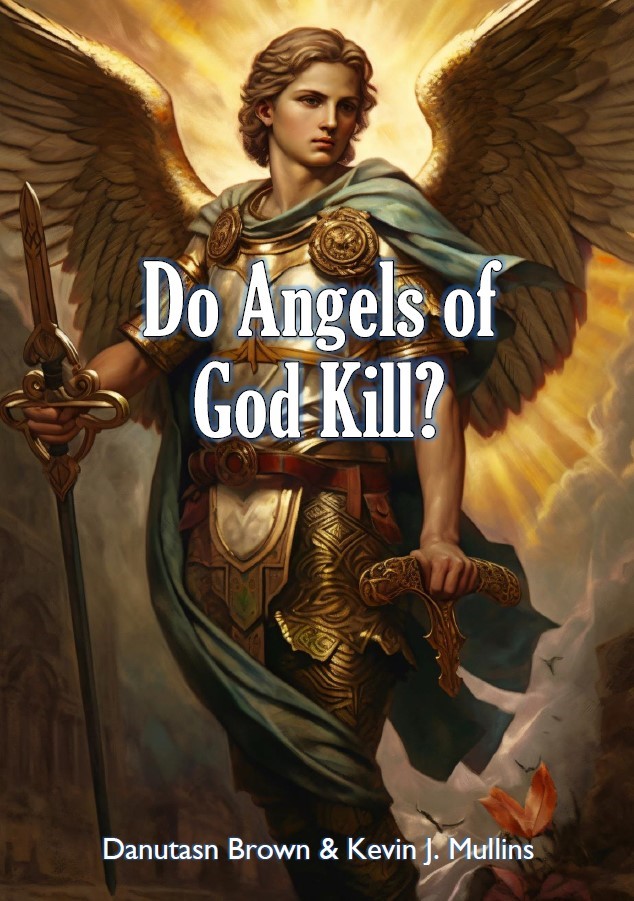
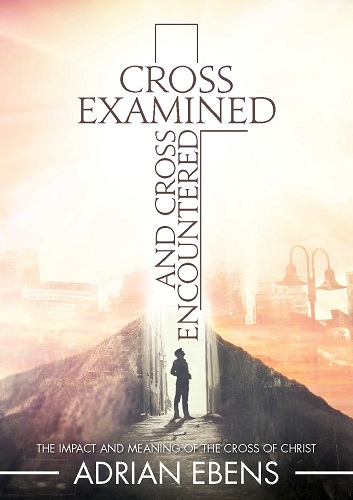
/Did_God_Kill_Jesus_(cover).jpg)
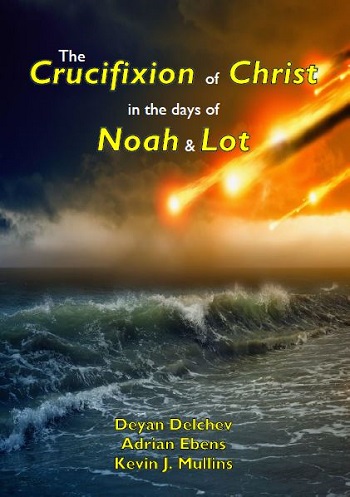
.png)
